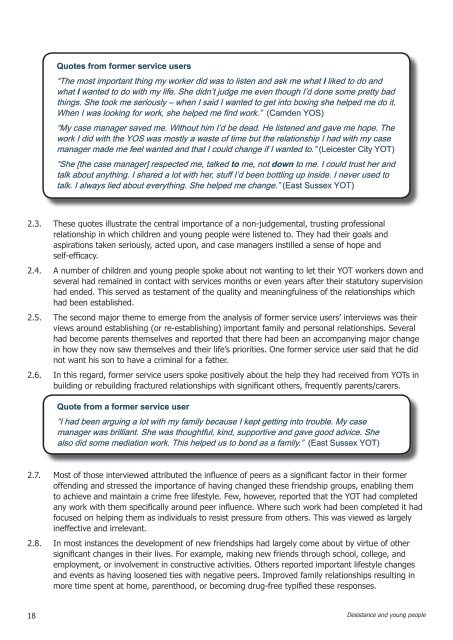Desistance and young people
Desistance_and_young_people
Desistance_and_young_people
Create successful ePaper yourself
Turn your PDF publications into a flip-book with our unique Google optimized e-Paper software.
Quotes from former service users<br />
“The most important thing my worker did was to listen <strong>and</strong> ask me what I liked to do <strong>and</strong><br />
what I wanted to do with my life. She didn’t judge me even though I’d done some pretty bad<br />
things. She took me seriously – when I said I wanted to get into boxing she helped me do it.<br />
When I was looking for work, she helped me find work.” (Camden YOS)<br />
“My case manager saved me. Without him I’d be dead. He listened <strong>and</strong> gave me hope. The<br />
work I did with the YOS was mostly a waste of time but the relationship I had with my case<br />
manager made me feel wanted <strong>and</strong> that I could change if I wanted to.” (Leicester City YOT)<br />
“She [the case manager] respected me, talked to me, not down to me. I could trust her <strong>and</strong><br />
talk about anything. I shared a lot with her, stuff I’d been bottling up inside. I never used to<br />
talk. I always lied about everything. She helped me change.” (East Sussex YOT)<br />
2.3. These quotes illustrate the central importance of a non-judgemental, trusting professional<br />
relationship in which children <strong>and</strong> <strong>young</strong> <strong>people</strong> were listened to. They had their goals <strong>and</strong><br />
aspirations taken seriously, acted upon, <strong>and</strong> case managers instilled a sense of hope <strong>and</strong><br />
self-efficacy.<br />
2.4. A number of children <strong>and</strong> <strong>young</strong> <strong>people</strong> spoke about not wanting to let their YOT workers down <strong>and</strong><br />
several had remained in contact with services months or even years after their statutory supervision<br />
had ended. This served as testament of the quality <strong>and</strong> meaningfulness of the relationships which<br />
had been established.<br />
2.5. The second major theme to emerge from the analysis of former service users’ interviews was their<br />
views around establishing (or re-establishing) important family <strong>and</strong> personal relationships. Several<br />
had become parents themselves <strong>and</strong> reported that there had been an accompanying major change<br />
in how they now saw themselves <strong>and</strong> their life’s priorities. One former service user said that he did<br />
not want his son to have a criminal for a father.<br />
2.6. In this regard, former service users spoke positively about the help they had received from YOTs in<br />
building or rebuilding fractured relationships with significant others, frequently parents/carers.<br />
Quote from a former service user<br />
“I had been arguing a lot with my family because I kept getting into trouble. My case<br />
manager was brilliant. She was thoughtful, kind, supportive <strong>and</strong> gave good advice. She<br />
also did some mediation work. This helped us to bond as a family.” (East Sussex YOT)<br />
2.7. Most of those interviewed attributed the influence of peers as a significant factor in their former<br />
offending <strong>and</strong> stressed the importance of having changed these friendship groups, enabling them<br />
to achieve <strong>and</strong> maintain a crime free lifestyle. Few, however, reported that the YOT had completed<br />
any work with them specifically around peer influence. Where such work had been completed it had<br />
focused on helping them as individuals to resist pressure from others. This was viewed as largely<br />
ineffective <strong>and</strong> irrelevant.<br />
2.8. In most instances the development of new friendships had largely come about by virtue of other<br />
significant changes in their lives. For example, making new friends through school, college, <strong>and</strong><br />
employment, or involvement in constructive activities. Others reported important lifestyle changes<br />
<strong>and</strong> events as having loosened ties with negative peers. Improved family relationships resulting in<br />
more time spent at home, parenthood, or becoming drug-free typified these responses.<br />
18 <strong>Desistance</strong> <strong>and</strong> <strong>young</strong> <strong>people</strong>


